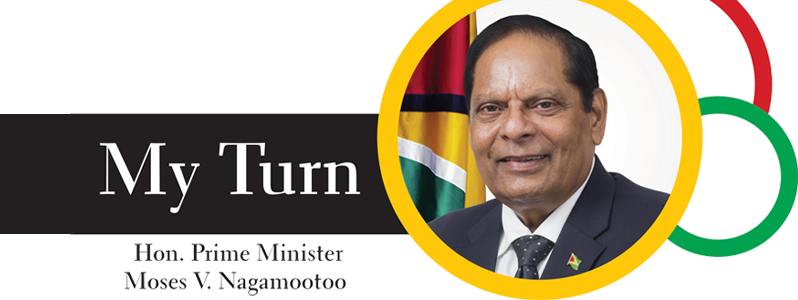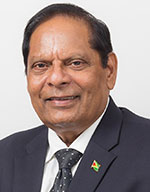ON Friday, an open consultation on whether the 14% value added tax (VAT) on private tuition fees should be re-considered turned into a debate on public versus private education. In Guyana, both private and public tuition constitute the formal education system and complement, rather than rival, each other. There is however, a stark difference in the form each takes: education in private schools is a fee-paying enterprise; education in public schools is free!
I have benefitted from both public and private education. Whilst my primary school education, which included gardening, wood-working and pupil teacher’s tuition was free, I had to work as a part-time fish vendor to pay fees at a private high school. I gathered, penny by penny, the princely sum of $18 to pay the first term’s fees.
Private school education opened the avenues for my future career, the early part of which was in teaching. This would be 50 years since I co-founded two high schools in West Berbice, which shows that I am not uninitiated in the operation of private educational institutions, for fees, though my motive in doing so was not for profit.
UNPOPULAR
At that time, I considered all sources of education, whether public or private, to be a social value. And not having to look then at government’s bigger picture to finance social services, I would have rebelled if I were required to pay a tax on tuition fees which working-class parents could hardly pay, in the first place. So, with the introduction of a value added tax on private tuition, I could relate to the sentiments being voiced against it.
It is clear that VAT on private tuition fees is unpopular. It has caused not only unease in the society, as Education Minister Dr Rupert Roopnaraine stated. It has also burdened parents who choose to send their children to privately owned schools and now have to pay more, as a result of the tax which took effect from January 1, 2017.
There have been protests over the VAT and Friday’s consultation between a ministerial team and operators/parents/students probably allowed interested parties to articulate as best as they could, their position on the tax..
Before this consultation, Cabinet, on at least three separate occasions, discussed a possible review of the measure. Though there have been mixed views, no one has ever justified any measure that could constitute an oppression on parents.
AGITATION
The VAT was introduced in 2007 by the Jagdeo Government, with wide application at the rate of 16%. Whilst the minimum wage was frozen and increases were contained to an average 5% annually, there was justifiable agitation for reduction of VAT to bring down the cost of goods and services. But the Government held on to the 16%, and refused to compromise. It had argued that for every one percentage point that VAT was reduced, the Government would have lost $2.5 Billion in revenues.
When I met President Ramotar on the issue as part of a delegation from the Alliance For Change (AFC), he wanted to make a deal to reduce VAT in return for our agreement for his government to withdraw subsidies on electricity for the Linden bauxite community. We rejected Ramotar’s diabolical plot to bring oppression on the people of Linden.
It took a new government, our Coalition Government, to reduce VAT to 14% within two years of coming into office. Simultaneously, we increased the threshold from $10 million to $15 million in order for a business to become a registrant, so that the number of registrants would be reduced from its original level of 3,750 registrants.
SWEEPING CHANGES
As part of sweeping tax changes advised by a Tax Reform Committee, the income tax threshold was raised to $60,000, which removed several thousands of wage earners from the tax net; and the rate of income tax deduction was reduced to 28% for persons earning up to $100,000 and one-third for persons earning more than that. Besides, the minimum wage and old age pensions were increased, and public service wages went up by 38%.
The State gave up some $10 Billion in revenues from the general package of tax relief and concessions, even though the current budget was in deficit to the tune of some $38 Billion. The way out was to increase borrowing, cut expenditures or widen the tax base, or all three.
To avoid cutting social sector spending, the Government introduced some new tax measures, among which was a 14% VAT on tuition fees charged by privately-owned schools. This tax was expected to bring in some $360 million, which is hardly enough to impact on spending, but was worth pursuing on the ground that most of the private schools were not paying taxes on their profits. That argument for VAT on private tuition fees has spawned big contention, but in the exchange of views, some revelations about private education operations have reached the public domain.
According to Finance Minister Winston Jordan, it is estimated that there are some 86 private schools operating in Guyana, many of them making huge revenues. Fees range from between $144,000 and $300,000 annually, which do not include extra lessons, uniforms, books, coaching fees, etc. The top eight among these private schools rake in fees estimated at over $2 Billion annually. It might be revealing if the Guyana Revenue Authority (GRA) could indicate how many of these private schools pay taxes.
In spite of the spirited agitation for withdrawal of the 14% tax, only about one-quarter of the private schools are registered for and are VAT-compliant, and prior to 2017, some of these entities were refunded some $150 million in VAT. It was expected that the refunds would have been ploughed back into the school system, and resulted in reduced tuition fees.
FRINGE ARGUMENT
While the case in favour of review or reversal of the VAT on private tuition fees was well made, a less than meritorious fringe argument was advanced to suggest that the Government had callously and oppressively taxed “education.” That slogan “tax on education” became a misguided but bitter refrain, to which I responded assertively: “It could not be an oppression when this Government allocates $43.1 Billion or 17% of its budget on public education this year and during 2015/2016 it spent some $70 Billion.”
In answer to one attendee who emotionally stated that this Government was “starving us,” I pointed out that this year $1.9 billion was allocated for the school feeding programme, and previously, during 2015-2016, some $2 Billion went to provide hot meals for schoolchildren. I also referred to the unprecedented record of this Government through an initiative by President Granger to provide students countrywide with buses, boats, bicycles, books and even breakfasts. A lap-top for each teacher has been initiated.
There were a few persons who painted a picture of unavailability of access to university education, hence the reliance on private schooling. It is admitted that while there are insufficient places for all students, university education is still accessible and Guyana graduates some 1,000 such students every year. Besides, all students at the University of Guyana could access the Student Loan Fund, which has been in existence for many years. This Government is engaged in replenishing the Revolving Fund, which was placed in reverse gear as defaulters owed an estimated $9 Billion. And teacher-training remains tuition-free.
ENTREPRENEURSHIP
No one faults those who are introducing entrepreneurship in education and for making a few bucks. But they do not have to justify this by pulling down the efforts of the State in the public education sector.
It is true that private tuition is in demand and is flourishing, due to the declining quality of public education. A Commission of Inquiry has been appointed to look at the reasons for this, and an emergency programme for upgrading teaching of mathematics has been introduced. But much more has to be done.
However, it should be accepted that public education is competing with other social sectors for scarce revenues. For example, in the 2017 Budget, $31 Billion was allocated for public health and $29.1 Billion for public security, both sectors being vitally important for our people’s care and safety.
In addition, there has been a drain on limited public funds to finance the sugar industry. The Coalition Government has diverted $32 Billion since it took office two years ago, to save the jobs of sugar workers who have been trapped in an industry that has been bankrupted under the former government.
In this context, the effort to squeeze a little juice from private schools to help salvage the demand for public funds was well-intentioned. At the time of its introduction, it was not anticipated that VAT on private tuition fees would have triggered a social response that would render this measure to be unfeasible, and make a review or reversal of it unavoidable.
This is the decision that Cabinet has to make.





.jpg)








